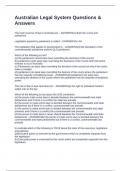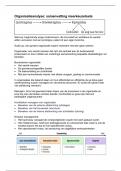Exam (elaborations)
Australian Legal System Questions & Answers
- Course
- Institution
The main sources of law in Australia are: - ANSWERS(c) Both the courts and parliament Legislation passed by parliament is called: - ANSWERSAn Act The legislation that applies in Queensland is: - ANSWERS(d) the lesislation of the commonwealth parliament and the QLD parliament Which of the f...
[Show more]




